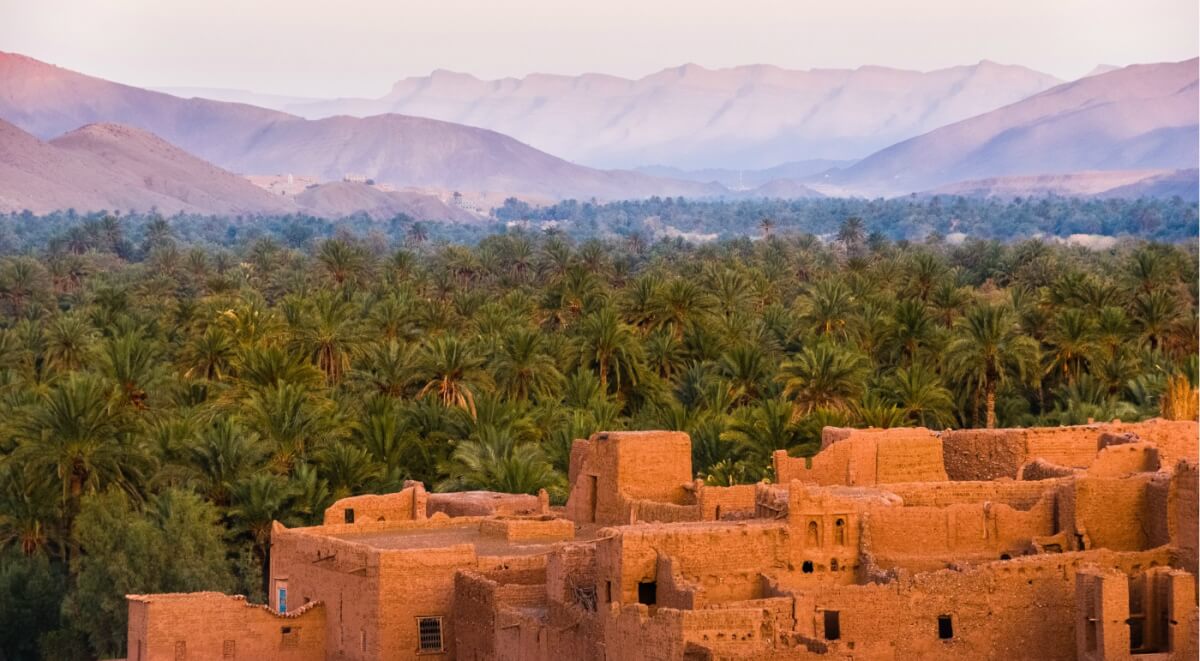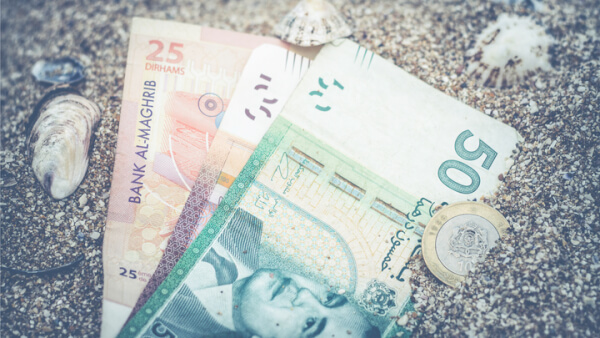Money in Morocco: Banks, ATMs, cards & currency exchange
Morocco’s tourist industry accounts for a significant slice of its GDP. Cruise ships sail in to the major ports, day trippers pop over from Southern Europe,...

Morocco is a hugely varied country, appealing to those looking for sun, sea and sand - as well as the more adventurous looking to explore the legendary Marrakech medina, or get up into the majestic Atlas mountains. Along with holidaymakers, Morocco is also popular among digital nomads, surf fans, and anyone looking to live and work in a varied, exotic and friendly place.
Whatever your reason for going, you’re going to need some cash to make the most of Morocco. ATMs are a handy way to withdraw local currency while you’re in Morocco, as long as you avoid common pitfalls and unnecessary fees. Here’s all you need to know about ATMs in Morocco.
You’ll find ATMs in the towns and cities in Morocco, but when off the beaten track, this will be far harder. Small merchants are unlikely to accept cards, and expats living in Morocco warn newcomers that ATMs are sometimes out of cash if it’s been a busy period for the bank. Carry some currency on you to cover emergencies.
If you’re in one of the towns or cities you’ll find a bank pretty easily in the commercial centre - otherwise, find a convenient ATM by using one of the following ATM locators:
You can use credit and debit card in in towns and tourist areas in Morocco. Visa and Mastercard are most widely accepted. If you usually use an Amex card, you’ll need to take an alternative card or carry enough cash for your trip, as you may not be able to find an ATM to withdraw cash easily. Discover, on the other hand, is widely accepted at both merchants and ATMs.
Wherever you are, check out the nearest ATM on the same network as your card, with one of the following locators:
To use an ATM in Morocco, you’ll generally need a 4 digit PIN code. That means that cards with chip and pin technology from Europe, the UK or Australia, for example, are widely accepted. However, if your primary card is an American magnetic stripe card, and it doesn’t usually require a PIN, you’ll need to get a PIN issued by your bank before you travel.
If your home bank has a daily cash withdrawal limit then that’ll dictate what you can withdraw from ATMs in Morocco.
In general, ATMs in Morocco will be set to a maximum withdrawal of something like MAD2,000 or just a shade over USD200. If you need more than that then you might have to make several transactions, and even choose different ATMs as banks might not allow multiple transactions with the same card in case of fraud.
Paying for your holiday with a bank card abroad is convenient and easy - unless your home bank’s fraud department limits or blocks your card. They might do that if they identify a change in your spending pattern, just in case your card is lost or stolen. They do this for your protection, but it can be extremely frustrating.
The easiest way to avoid issues is to let your bank know your plans in advance. Just call into your local branch or find the online form which is usually available by logging into your online banking.
Some bank ATMs in Morocco charge a fee per withdrawal, but the exact cost can depend on where your card was issued, and through which bank.
Dynamic currency conversion (DCC) is a common, costly, and entirely avoidable problem for travellers. This is where you’re asked if you want to pay for your transaction in your home currency as opposed to the local currency, dirhams. Stores, restaurants and ATMs will offer this and present it as a service - you can see the cost in your home currency so you don’t need to worry about figuring out the exchange rates.
Unfortunately, it’s not so simple. DCC transactions don’t generally use the real, mid-market rate - the one you’d find if you googled it. If you pay in your home currency, the foreign bank or ATM provider decide the exchange rate for you. They want to make a profit, so they can mark up the rate and pocket the difference. Pay in the local currency instead, and you’ll almost always get a fairer rate on the exchange.
Bank fees for overseas ATM withdrawals are fairly common, but the exact amount is different for every account. Check out the details before you travel to avoid nasty surprises. You can find everything you need in your terms and conditions document, which is usually available online.
As well as anything you have to pay your own bank, you might also be charged by the local bank or provider, when you use ATMs in Morocco. Despite this, if you get a decent exchange rate - by avoiding DCC - ATMs are still often an economical choice.
It’s unlikely you’ll get free cash withdrawals in Morocco if you hold a bank account in a currency other than dirhams. The chances are you’ll be charged by either your home bank or the ATM for the currency conversion.
Reduce ATM fees in Morocco with a few simple tricks. Here are some ideas to start you off.
If you bank with a global brand, you might find that your home bank works in partnership with an institution in Morocco to offer free or cheap international cash withdrawals to their customers overseas. Some of the banks in Morocco are also subsidiaries of French institutions, so if you hold a French account it’s definitely worth asking them about partners in Morocco before you go.
If you have several bank accounts, check the terms and conditions of all of them. It’s not the most gripping read, but it could save you money, as each bank has its own charging structure for international cash withdrawals. Some are much cheaper than others, so by doing a bit of homework, you can use the one which has the fairest fees. Leaving you with more cash in your pocket to enjoy your trip.
Foreign currency credit card cash advances are usually an expensive choice, and best avoided.
Don’t assume all the fees are the same. Often the worst deals on ATMs are to be found in places with a captive audience - tourist locations, pubs, and nightclubs are notoriously bad. Stick to an ATM in or near a bank branch, ideally within working hours so you have a contact available in case there’s a problem.
Remember DCC which we discussed above? If you’re offered the opportunity to pay in your home currency, just say no. Choosing the local currency is almost always cheaper because it avoids the high fees and poor exchange rates added thanks to DCC.
If you’re looking for a better way to get cash for your trip for Morocco, try Wise. You’ll get your cash converted using the real, mid-market exchange rate, with just a transparent fixed fee, which is set out upfront.
If you or a friend have a bank account in Morocco, just transfer money between accounts ahead of time, and you can withdraw dirhams as and when you need to, from ATMs during your stay. You don’t have to carry around too much cash, and there are no exchange rate rip-offs to worry about.
For many travellers, ATMs are a convenient way to get the cash you need for a visit to Morocco. As long as you can avoid DCC, the exchange rate used should be relatively fair, although you should also check out the fees charged both by your bank and the ATM provider to make sure you’re not getting ripped off. Alternatively, use Wise, to send money to a local account, and avoid the charges associated with overseas withdrawals at ATMs altogether.
This publication is provided for general information purposes only and is not intended to cover every aspect of the topics with which it deals. It is not intended to amount to advice on which you should rely. You must obtain professional or specialist advice before taking, or refraining from, any action on the basis of the content in this publication. The information in this publication does not constitute legal, tax or other professional advice from TransferWise Limited or its affiliates. Prior results do not guarantee a similar outcome. We make no representations, warranties or guarantees, whether express or implied, that the content in the publication is accurate, complete or up to date.
*Please see terms of use and product availability for your region or visit Wise fees and pricing for the most up to date pricing and fee information.
This publication is provided for general information purposes and does not constitute legal, tax or other professional advice from Wise Payments Limited or its subsidiaries and its affiliates, and it is not intended as a substitute for obtaining advice from a financial advisor or any other professional.
We make no representations, warranties or guarantees, whether expressed or implied, that the content in the publication is accurate, complete or up to date.

Morocco’s tourist industry accounts for a significant slice of its GDP. Cruise ships sail in to the major ports, day trippers pop over from Southern Europe,...